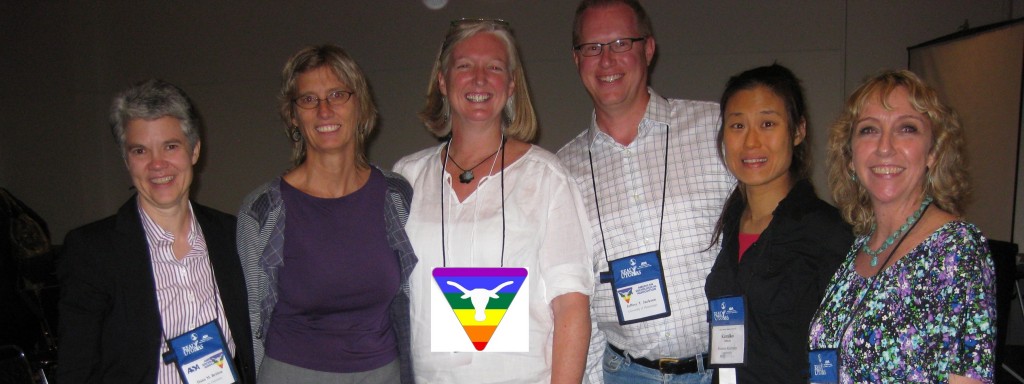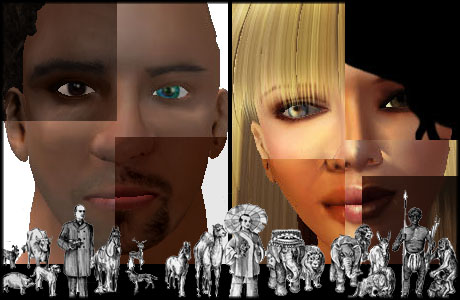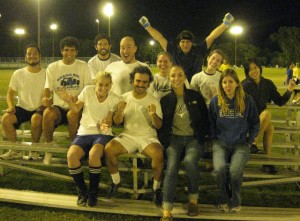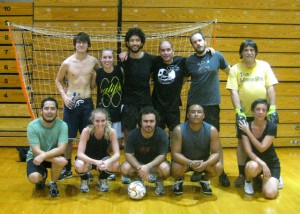Initiating our work/life balance series for 2012-13
Dr. Gloria González-López is a Gender and Sexuality scholar working with Mexican and Mexican American communities, with an emphasis on social inequality. She is a prolific author and serves as the Minority Liaison Officer for the Sociology Department at UT Austin. She is also a truly humane being. Based on her own life and professional experiences, she shared insights on maintaining a healthy and balanced life with graduate students and staff in the first of a series of conversations on work/life balance.
Dr. González-López, who joined UT Austin in 2002 as an Assistant Professor, suggests that caring about yourself and others lays the foundation for building good health and community. She walks every morning in order to maintain balance and claims staying healthy and being able to be a happy Sociologist is not impossible.
Some lessons learned:
• Sharing well-being tips with others is helpful
• Self-care is basic: eat, sleep and exercise
• Sleep 8 hours, or enough to feel rested and have a clear mind – don’t compromise
• Having a schedule that includes exercise is vital
• Turn off your electronic devices at a certain time every night
• Try not to answer emails on the weekend (unless there is something truly urgent! —yes! the rest can wait)
• Don’t text while driving
• Taking time off makes you more productive, produces more publications, keeps your research interests dynamic
How do you have a personal life, or possibly a family?
Since there is so little time to write, those who are successful remain highly focused, disciplined and happy, although highly scheduled. Remember, your academic life cannot become your main source of happiness. Life brings its own rewards.
Mentors really made a difference through true care and cultivation. This makes all the difference. It also pays to be mentored by someone who is living a well-balanced life. Repay their efforts by paying it forward and becoming a great mentor to your students.
Cultivating mentors: Be honest about your needs, visit during office hours and do not overwhelm people. Show faculty members respect for their time and expertise. Take baby steps in building relationships and look for chemistry and similar interests beyond shared racial or sexual identities. A relationship with a mentor is after all a human relationship – a special one.
Don’t put life on hold because of your PhD:
This can create resentment and inhibit your productivity. Turning off the computer on the weekend was really helpful. Carrying around a small notebook helps to capture ideas without turning on the computer. Gloria’s recipe for success in her own life: M&Ms, mountains and movies on the weekend. By Sunday you’re looking forward to Monday and getting back to writing.
Do not isolate yourself. Misery loves company, but also swap strategies for success. Ask people who are happy how they do it. Have at least one friend who is not a Sociologist, outside academia. Not losing touch with everyday life and staying grounded helps to stay mentally healthy and socially connected. It is a privilege to be a professor and humanizing to talk with people about the price of tomatoes and the election at the grocery store.
While she was in graduate school, Gloria was accepted with no funding, so accepted a TAship outside the department in her first year. She did not take the required course load in her first year so soon she was told that she was “out of sequence.” When the chair of the department told her, she wanted to leave but was talked out of it. It was a rough start, people were leaving but Gloria talked herself out of it and developed a thicker skin and some resilience. It’s easy to shrink and lose confidence. The wonderful, supportive mentors in her department helped her generously — she survived. Going to counseling was very helpful and she was fortunate to find a therapist who was also a professor aware of her struggles. She gained new contexts for academic life.
Learning to unplug from work without feeling guilty is vital:
In Sociology we study slavery. What about self-slavery? Academic slaves should unite to abolish self-slavery. Comply with what is required. Find out what to do to get tenure: book, #of articles, other collaborations and contributions. Gloria made the promise to herself to become a professor and get tenure as long as it feels OK with the rest of her life. That promise lays the foundation for self-respect rather than self-slavery. Intellectual ambition and intellectual greed should be differentiated. Herein lies the compromise in living a healthy life. The ego is highly invested in one’s profession: how many times you are cited, falling prey to the smartest person in the room syndrome. The tendency to look at who is ahead and come up lacking rather than seeing where you are in a continuum of scholars fosters insecurity. Perfectionism is the bane of academic success.
At ASA a senior scholar got an award and complained that he was not nominated the year before. Gloria was shocked while learning about the ways in which even people who have succeeded apparently might not be aware of these painful traps. This is a sad state of affairs. The take away: conventional definitions of success do not guarantee happiness. The most successful are not necessarily the happiest. Rescuing the humanity in your life and checking your motivation for doing Sociology is so important. Gloria wanted to work with adult scholars in community colleges. She did not get the job in a teaching college so started applying to R1 Universities. A newly minted PhD, she was a finalist 4 times before being offered a job at UT. UT was her opportunity # 5; her resilience and determination were rewarded. The thought of doing something to transform society is very motivating. It’s much more important to be relevant than famous.
Taking an Astronomy 101 class can help you get some perspective on how tiny you are. Remind yourself that making a difference in the lives of even a few people is really important and very fulfilling. Arrogance hinders learning. Staying humble is a good exercise, which also helps in dealing with the publication review cycle. The reviewers can be aggressively critical. Gloria includes the following comment in her reviews: “Please feel free to edit my recommendations so we make sure that the author receives feedback in a kind, supportive, and compassionate manner.” This helps to mitigate the culture of intellectual violence that can be so damaging. Transforming the culture of scholarship in the direction of kindness is needed and important.
Think of projects that are highly needed in communities of your interest and pursue them in a way that’s not self-punishing. It’s not always easy, which is why it’s important to take time periodically to touch base with your original motivation. Don’t lose the larger picture of life.
Participant Comments
Juan Portillo
“I am grateful to Dr. Gloria González-López for taking the time to share with us her experiences and her wisdom during the wellness and self-care talk. In particular, I appreciated her answer to the following question: how can one approach colleagues and professors who are coming from a different epistemological stance and may not know how their words and actions in and out of class can harm or marginalize students? Dr. González-López gave an example of a student in a class she taught many years ago who straight up told her he did not get feminism and would sometimes make hostile comments. She then decided to utilize her relationship to other students in the class to work together and manage the class discussions in a way where he could learn and grow. I realized then that the best way to approach any problem in academia is to not do it alone. I have relied many times on professors and other graduate students to solve personal and professional problems. Thus, I realized that within the message of self-care there is an implicit expectation that we can also take care of each other. This way, academia does not become too individualized, competition does not rule, and intellectual growth can take place. I am now more ready to be supportive of my peers and professors.”
Amias Maldonado
“ I found the work/life balance discussion to be incredibly rewarding on many levels. On a personal level, it was a safe space to communicate feelings that we graduate students all experience yet hide from each other. On an institutional level, knowing that we have reflexive, open, well-rounded people like Gloria in the sociology department makes me feel proud and supported. And on a practical level, Gloria offered many helpful strategies and ways of thinking that will certainly help me retain my sanity as I go through the graduate program.”
Katie Jensen
“The largest issue I face, and I feel many others face in graduate school is self-punishment. Especially the first year of graduate school. The load was such that I was unable to produce the quality I had always prided myself on. My identity and self-esteem was and is tied up in “being and believing I am a good student.” And graduate school became the first time in my life where I had to read strategically, read only the topic sentences; try to get the general argument without immersing myself in the specificities of the work. And I had never wanted to be that type of person. So how do I not punish myself for engaging in behavior I had always prided myself on not engaging in?
Secondly, often the solution we present to maintaining “work/life” balance is to make boundaries, to set aside chunks of time for life (e.g., don’t work on Sundays, don’t work after 6pm). It’s true that otherwise work will take over, and fill the space we do not consciously take from it. But does anyone else ever feel that this becomes another way that my life is regimented? That the key to happiness and balance becomes constructed as yet another obligation? Personally, I love to run. Some of the happiest, most mentally sound times of my life have been when I have gone for jogs every day – doesn’t matter how long or how fast. But, in graduate school I easily fall out of the habit, I repeat the horrible mantras “I’m too busy”, “There’s no time” or, one of the worst – “I didn’t finish what I sent out to accomplish today, so I don’t deserve and can’t have the reward.” So I have to force myself to take time for myself. But I can’t figure out how to remove this language of force, this sense of obligation, which I find so antithetical to the whole point of work/life balance.
So, my tips for resilience:
Do something social each day, whether it be a coffee or lunch date, drinks with friends, or soccer games.
Always do something between work and bedtime, no matter how late it is.
Always do something in the mornings before work – I like to watch shows like “Saved by the Bell” or “The Wonder Years” while I eat my oatmeal and prepare for the day.”
Julie Skalamera
“First and foremost, I want to thank you both for encouraging dialogue on well-being. I feel very fortunate (and rather proud) to be a member of a department who takes time to discuss and puts special emphasis on this important topic! I am also inspired by hearing others’ stories. Today was such a wonderful experience for me, and I am excited that it IS possible to have a well-rounded lifestyle AND productive career.
In terms of more specific comments and feedback… I will definitely keep in mind the advice and lessons that were shared today as I launch my graduate school career here at UT. I appreciated the dialogue about keeping in mind the larger picture and remembering what wakes me up and gets me excited to be doing sociology. As we discussed, it is truly a privilege to be a member of this community and to be pursuing my research interests. I am still adjusting to life as a graduate student in a new city — balancing the workload, meeting new people, exploring an unfamiliar environment — and I learned today that this adjustment period will be a process. I will need to be patient with myself as I determine study habits, time management, and fitting in my personal life. Again, the discussion today was helpful, refreshing, and very much appreciated.”







